SUMAC first came to fruition when Aaron Turner, also of Isis, Old Man Gloom and Mamiffer, had the urge to once again create colossal-sounding music. A goal for the band to strive for was to write some of the heaviest music Turner had ever written, and he found an ideal partner with Baptists drummer Nick Yacyshyn. The duo added Brian Cook, of Russian Circles, Botch and These Arms Are Snakes, and released their debut, The Deal, via Profound Lore Records on February 17, 2015.
The band’s sophomore LP, which has already been generating excitement from music media taste makers and fans alike, was announced via the band’s Facebook page, and What One Becomes will see the light of day via Thrill Jockey on June 10. What One Becomes was tracked at The Unknown in Anacortes, Washington, and mixed at GodCity Studios in Salem, Massachusetts with Kurt Ballou. The resulting five-song, hour-long LP is a dense aggregate of rhythm, force, and vigor.
Ghettoblaster recently spoke with Turner about the band, the new LP, self-exploration, facing challenges head on and creating honest and adventurous music.
How did Sumac become an endeavor that you all decided to pursue?
The idea for the kind of music SUMAC is now making has existed for some years now, and it wasn’t until 2013 that it actually started to take shape. I’d had the desire to start a new band for a while, though I wasn’t actively pursuing it as I had no idea who else would be in it. I knew the music was going to be demanding on a number of levels, and finding a great drummer was the first piece of the puzzle.
While attending local shows I was casually looking around for someone local who might be a good fit, and there wasn’t anyone whose playing I really connected with. At some point in mid-2103 I saw Nick performing with Baptists and was immediately drawn to his playing and intensity. It took a while for us to connect as at first I didn’t consider it a great prospect practically speaking – he lives in Vancouver which was far enough away to present a problem.
Eventually though our mutual friend (and eventual engineer), Kurt Ballou put us in touch. That was in early 2014 at which point I was more heavily invested in writing what would become the first album. After Nick and I played together for the first time it seemed pretty clear that it was a combo worth pursuing. Brian was an obvious choice – we’ve been friends for a long time, I love his playing and we’d discussed doing something together over the years. The initial work was truly a shot in the dark which was part of the fun of doing it, and it came together with surprising fluidity, and fortunately, deeply satisfying results. It was exactly what I’d hoped for, and it seemed Nick and Brian were just as enthusiastic and surprised by it as I was.
What was it about the other two musicians’ technical skills and the chemistry that you have with them that continues to make the band a fulfilling pursuit?
As alluded to earlier, Nick’s intensity was the main factor in wanting to play with him – there is wild forcefulness and conviction in his playing that is incredibly powerful. Beyond that, he’s a very inventive player, his choices are far from obvious, yet never take away from the music – it’s the perfect combo of providing strong support and creative embellishment. It’s a good counter-balance to the role that guitar plays in SUMAC – the drumming is very musical and the guitar is often more rhythmic and textural than overtly melodic.
Nick and I didn’t know each other at all, and as it turns out we get along very well on a personal level which is another crucial factor. As for Brian, he’s been on many of the Mamiffer records I’m also on, so we’d already worked together in that context. I’ve been a longtime admirer of his playing, starting in Botch and on into These Arms are Snakes, and now Russian Circles. His playing is also perfect for SUMAC as there’s a sense of gravity and determination in the way he plays, and the sound he’s developed over the years is appropriately immense. He’s restrained and solid in the best sense possible, has a great deal of soul in his playing, and great harmonic/melodic sensibilities.
The three of us are a very compatible unit in how we get along, and I can’t emphasize enough how important that is and how much more enjoyable it makes the experience of doing this band together.
Also, is there a nicer dude than Brian Cook?
Get in a car with him in heavy traffic and you’ll see his dark side. Otherwise no, I know few people who are as kind and gentle as Brian Cook. Nick is alright too.
What were you hoping to accomplish artistically with What One Becomes? There are some pretty deep questions about self and self-discovery you were wrestling with here, correct?
Making music is a constant process of self-exploration, and by extension a point of connection to others and to collective life force. Seeking understanding, striving towards acceptance of life and self, and working towards ecstatic states of joyfulness through playing music are the goal – not only in SUMAC, in just about everything I’ve been lucky enough to participate in.
In the context of What One Becomes part of the process involves confronting things in myself that I’ve had difficulty with and have caused me suffering, and also those reflective facets that come through interaction with others. I’ve found part of my experience as a constantly evolving/transforming human has been about who I wish myself to be vs who I really am, and about the latent aspects of self that are revealed in times of emotional distress or circumstances of extreme pressure. The desire to hide those parts of myself is strong, as has been the desire to hide from or run away from difficulty when it arises. I’ve found that the process of hiding and escaping often causes more suffering than the things themselves that I’m striving to avoid. Fear is the motivating impulse behind these behaviors, and in that sense the album is ultimately and expression of, and potential exorcism of fear, beyond which lies a widened experience of total life and expansive love.
When did you begin writing the record?
Very shortly after the release of The Deal in 2015, in fact some of it may have even been parts I discovered during the writing of that album and wasn’t ready to integrate into it. So far the inspiration for writing in this band has been strong and consistent. It’s tempting to just keep writing new material in lieu of rehearsing/performing what we’ve already made, so I’m trying to find a balance between touring behind the albums we’ve made and beginning work on whatever will come next.
I’m really enjoying playing this material live and it is meant to be experienced primarily in that context. It’s just a matter of finding the time to pursue playing live, and also following the path of creating new music that we’ve set out on.
Were there things that you discovered about your intent here or the compositions of the songs that you realized in the studio?
Yeah – this material is even more challenging than I initially realized. It’s one thing to play the parts alone for hours on end. It’s quite another to get a group together on what are some fairly rigorous pieces, which alternate between that which is carefully composed and that which is almost entirely free form. Trying to verbally convey what the intent is with a song, both the emotion behind it as well as what the structural devices are is difficult. Fortunately we’re operating on an advanced level of intuitive communication and mutual understanding that helps push the music in the right direction without having to scrutinize and negotiate every move we’re making.
What are you hoping your audience takes away from the experience of listening to it?
An increased awareness of their own consciousness, a desire to live life with passion and determination, to confront and grow with/through difficult passages in life, a deepened sense of connection to self and others, and a sense of primal urgency in relation to the gift of life we’ve all been fortunate enough to receive. I believe music is truly transformative and it’s not too much to ask of it, of its creators and it’s listeners that it improve, expand and ultimately benefit both individuals and collective humanity.
Discovering adventurous music offered me a doorway to a whole new set of perspectives on what it means to be alive, and I hope through our music and all the activities related to it we can help do that for others as well as ourselves.
What have you learned about yourself and your craft by pursuing SUMAC?
It’s helped confirm and in some ways renew the beliefs I’ve outlined above. It’s shown me over and over again just how important connection with others though music is, how my own happiness depends on sincere and focused creative action, and that the willingness to risk failure is still one of the best assets anyone can have – in order to navigate not only creative endeavors, but life itself. It has also helped reveal how my own insecurities and small mindedness can hamper me and constrict my world view and enjoyment of life. It’s been a fascinating portal through which I can examine both the healthy and destructive aspects of ego. I want and need for my work to be loved and enjoyed, I also don’t want that need to manifest in neurotic behaviors that define who I allow myself to be or rob me of the volition to make honest music.
SUMAC begins a tour in support of the record in just a few days. Will there be other tours in support of this album cycle?
Yep – we’re touring Europe with Mamiffer for a short run later in June/July, and moving on to an east coast tour in August. Very much looking forward to playing this music for more people in as many places as it can take us.
(Pre-order What One Becomes on Thrill Jockey:www.thrilljockey.com/products/what-one-becomes.)



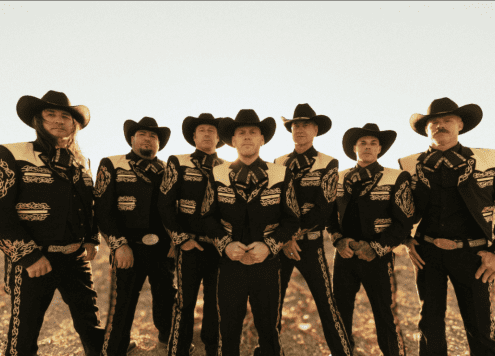
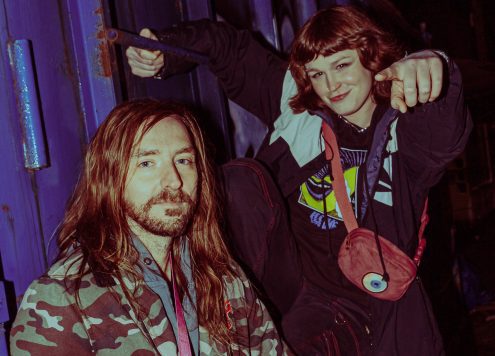
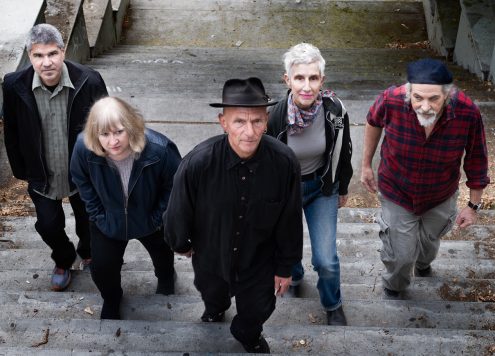
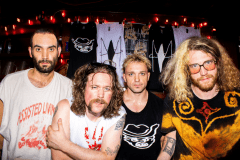
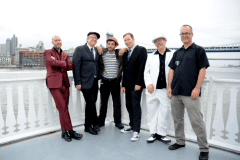

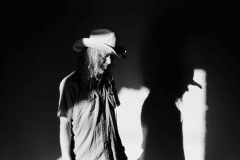

Social Media